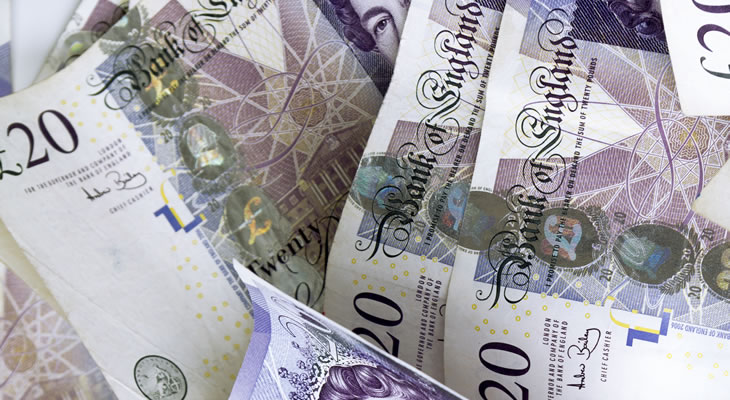After ending last week above the key level of 1.14, the Pound Euro exchange rate has fallen again this week. Uncertainties about the UK government, the Brexit process, and now lower Bank of England (BoE) interest rate hike bets, have weighed on Sterling.
GBP began this week at the level of 1.1422 and at the time of writing had dropped to around 1.1300.
Pound (GBP) Plunges as Inflation Slows
Investors sold the Pound on Tuesday in reaction to June’s UK Consumer Price Index (CPI) report, which fell short of forecasts.
Analysts had expected UK inflation to remain at 2.9% year-on-year and slow slightly from 0.3% to 0.2% month-on-month. However, the results came in at 2.6% and 0% respectively, much slower than investors forecast.
This drop in inflation was largely caused by global factors such as fuel, as oil prices have weakened.
Either way, the biggest immediate effect the report had on markets was a drop in the Pound. Less investors now expect the Bank of England (BoE) to be facing enough pressure to tighten monetary policy in the near future.
Slowing inflation as well as underwhelming UK ecostats in recent weeks indicate that Britain’s economy may not be able to support tighter monetary policy any time soon, as more dovish and cautious BoE members have argued.
However, the inflation results aren’t all bad for Britain’s economic outlook. If inflation continues to slow, wage growth has a better chance of keeping up. This would lighten Britain’s pay squeeze dilemma.
Rising inflation and lower wage growth has led to a drop in real pay packets. This has made it difficult for UK consumers to keep up with rising high street prices.
If wages level out with inflation, retail activity could improve which would bolster Britain’s Gross Domestic Product (GDP) in the long-term.
For now though, investors are disappointed that the BoE is unlikely to act any time soon which has weakened the short to mid-term Pound outlook.
Euro (EUR) Benefits from Pound Weakness.
Euro investors are anticipating this week’s European Central Bank (ECB) meeting. The shared currency has been relatively sturdy and flat, but Sterling weakness has helped it push GBP EUR down.
This week’s Eurozone data has had little effect on the Euro so far. June’s final Eurozone inflation results met expectations in all major prints. Monthly inflation rose from -0.1% to 0%, while yearly inflation slipped from 1.4% to 1.3% as forecast.
The core inflation print advanced from 0.9% to the projected 1.1%, indication that Eurozone inflation was generally recovering. While this is likely to be good news for the ECB, it is not enough to lead to tighter monetary policy in the short-term future.
Investors expect the ECB will repeat the tone seen at the last meeting, cautiously optimistic and leaving the door open for more hawkishness to be possible towards the end of the year.
If the bank becomes notably more hawkish, bets that the quantitative easing (QE) end-date could be announced in the foreseeable future will surge.
On the other hand, if the bank becomes more dovish again or indicates QE could be left in place longer than previously expected, the Euro would plummet and GBP EUR would make a strong late-week recovery.
Tuesday’s German and Eurozone confidence surveys from ZEW had little notable effect on Euro trade. While all prints fell short of expectations, they remained at generally strong levels.
The Euro outlook has been unchanged this week so far, but any shifts in tone from the ECB during Thursday’s meeting could be big news for Euro traders.
GBP EUR Interbank Rate
At the time of writing this article, the Pound to Euro exchange rate trended in the region of 1.1300. The Euro to Pound exchange rate traded at around 0.8850.


Comments are closed.